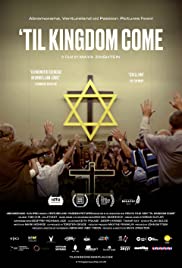
‘TIL KINGDOM COME
US, 2020, 76 minutes, Colour.
Directed by Maya Zinshtein.
This documentary was filmed during 2018, with a special focus on President Trump’s transferring the American Embassy to Israel from Tel Aviv to Jerusalem, the announcing of the President’s peace plan and the support of Benjamin Netanyahu, as well as delegations in Israel and to the United States of the leaders of Settler organisations.
This was the heyday of President Trump, flying high, relishing the attention, moving on the world stage. It also shows the range of religious advisors.
Seen in the light of President Trump’s defeat in the 2020 elections and the coming of the Biden administration, it is to be seen with quite a different perspective.
For some time, Americans and Israelis have been very conscious of movements of evangelical Christians in the United States in collaborating with Israel. The American perspective is very much Bible-based, a reading of the Old Testament, the Jewish Scriptures, with covenant promises, the triumph of the Jews, the defeat of their enemies. This ties in with the apocalyptic mentality of many evangelical Christians, conflicts, the tribulation, rapture, Armageddon.
This documentary focuses on a Jewish organisation and its founder, Echiel Eckstein, the International Fellowship of Christians and Jews, headquarters in Chicago and in Jerusalem, and his daughter, Yael Eckstein who succeeded her father. There are many interviews with father and daughter over the decades, public and political gatherings, Yael Eckstein and her travels around the United States, including a visit to Kentucky.
The documentary also focuses on a Baptist community in Kentucky, a dynasty of ministers, the Binghams, and their enthusiastic congregation, becoming involved in raising money for The Fellowship. The film is interspersed with interviews with the third and fourth Binghams in the dynasty, seeing them in action in their preaching, the younger man in his ordinary ministry with his flock, adults and children, the story of his cancer and healing, his visit to Israel and the Dead Sea as well as his discussion with a Lutheran minister in Bethlehem who is critical of the theology of the evangelical Christians and concerned about the fate of the Palestinians – with the younger Bingham saying he was not convinced, would believe the Scriptures, and that there was no such thing as a Palestinian.
This is a film which demonstrates very strongly the point of view of the members of the Fellowship, the enthusiastic meetings, social gatherings, political rallies, meetings of prominent evangelical pastors, especially Pat Robertson and his son, John Hague and other personalities on the President’s advisory board for religious issues. At many of the meetings, there are many Jewish Americans present, many of them affluent.
Clearly, as the film suggests with the introduction of the Lutheran minister with his critiques, with the gung ho enthusiasm of personalities who are promoting the settlements on the West Bank as the fulfilment of Scripture, with the enthusiastic Christians and their Pentecostal faith, audiences with a point of view will be reinforced in their point of view rather than being changed.
With the frequency of God language, the frequency of Jesus-language, ‘in Jesus name’, atheists will find it beyond belief! Christians who are not evangelical who do not share the fundamentalist interpretation of the Scriptures, will also feel that these interpretations are beyond belief.
One would like to interview the director as to why she included a final sequence with one of the Bingham ministers, face to camera, saying, unblushingly, that this was not the kind of thing he would say to Jewish people but then going into an enthusiastic tirade about the message of the Old Testament, the future of the Fellowship and his declaration the Jews would suddenly discover the Christian truth, be challenged and have to make decisions – suggesting that otherwise, hell could be a destination. Quite an ending to this documentary.
With the change of administration in the United States, with so many of the many religious advisors not having access to government and halls of power, the future of the Fellowship will be of great interest.